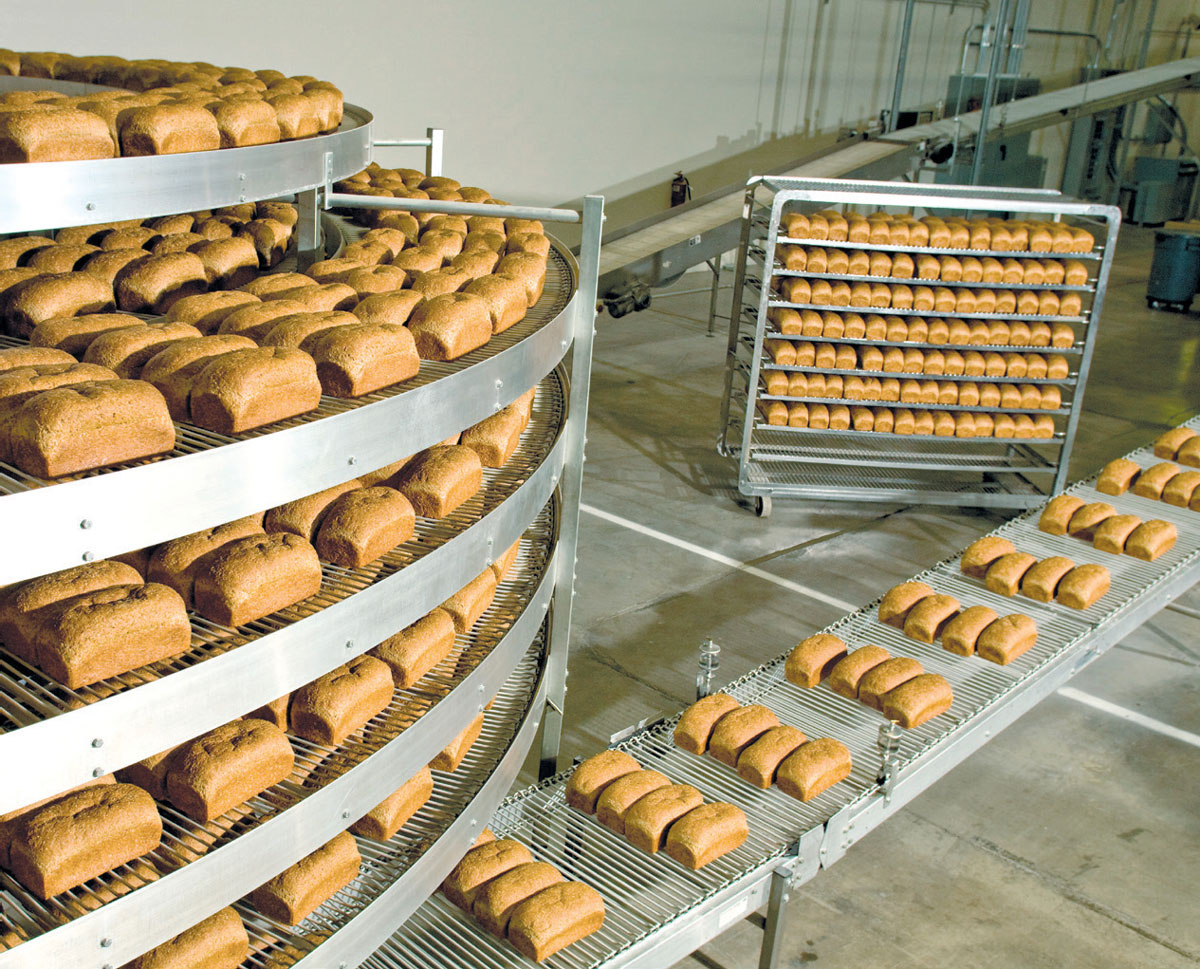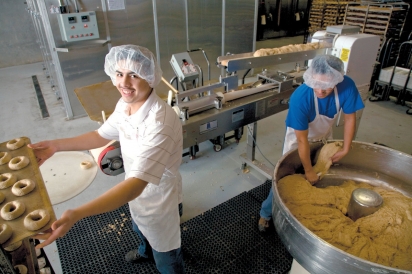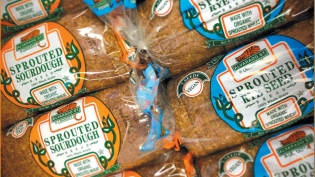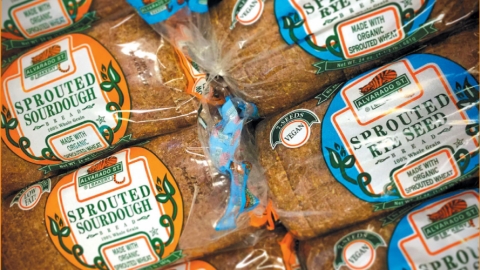From Preschool to PhD with Alvarado Street Bakery
I had a little trouble finding Alvarado Street Bakery— which is not, by the way, on Alvarado Street. It was apparent, though, when I got there, that I was in the right place. The wonderful smell of baking bread emanated out of the building into the parking lot, where it melded with the scent of fresh-cut grass, a glorious combination on any day but perfect on this toasty late spring one.
Alvarado Street Bakery has been a co-op since it started out 33 years ago, back when there were only five employees (it now has 117). What they mean by a co-op is that the company is owned entirely by the people who work there. It’s a democratic system that gives each member an equal say and equal pay, no matter their position.
For 25 of those 33 years Alvarado has been trying to get their organic sprouted wheat breads, buns and tortillas into school lunch programs, but has only had success in the past couple of years. The change came when the Obama administration came out with new requirements for school lunch programs, putting a greater emphasis on nutrition rather than cost, cost being what was holding Alvarado back from the start. Their breads are made with all-organic ingredients, which tend to be more expensive than conventional ones, making it tough to compete with other companies that offered cheaper bread. With nutrition as the new focus, Alvarado rose to the top. Besides nutrition, the increasing importance of sourcing food locally has helped Alvarado stand out as a distributor to schools in the Bay Area.
Alvarado’s bread is naturally more nutritious than that of their competitors due to the sprouting process they use. How is sprouted bread different than regular bread? When I sat down with Jim Canterbury, sales director for Alvarado, and Michael Girkout, the president of the co-op and the director of marketing, they both began answering the frequently asked question in unplanned synchronization: “Most bakeries get up in the morning...” and start the process of baking bread for that day, Michael continued. At Alvarado the process is much more labor intensive. They sprout the wheat one day for bread that will be baked four days later.
Alvarado buys whole organic wheatberries direct from a consortium of family farms in Utah. The wheatberries are not milled, but instead go straight into a soaking process in which they sit in filtered water for three to four days, becoming a living, breathing plant. The extra water is then drained away and the sprouts are ground into a wet mush, not a flour, as would happen with unsprouted wheat breads. This dough is the base for all their recipes, to which they add minimal other ingredients: a little fresh yeast, a sweetener like organic raisins or organic dates, and a bit of sea salt.
By contrast, most wheatberries are divided into three parts at the mill and the parts sold separately. There’s the bran, the starchy endosperm and the germ, which is full of vital nutrients and minerals that get milled out of processed flour, some of which are typically added back in chemically. Some breads are “enriched” with these nutritive additives, but Alvarado doesn’t have to do that because they don’t take them out in the first place. The nutrients become more readily available when the wheatberries sprout because the wheatberries do the work to make it easier to nourish their growing selves. The starches also start to break down and become more complex carbohydrates, thereby creating sustained energy as the breads slowly metabolize in one’s stomach and intestines. Alvarado’s products are naturally as nutritious as possible, making them perfect for growing and active kids.
Alvarado’s first school customer was the food director of the Santa Rosa City Schools, and, like their breads, their school business grew organically as word got out within the network of school food directors; nothing boosts sales more than satisfied customers who share the information with others. Alvarado distributes mostly to public schools, along with a couple of Headstart programs and some small private schools. While Alvarado’s breads are reasonably priced for what they are, they’re still more expensive than the bread that many schools typically source, bread Jim referred to as “the most nutritionally-void paste baked off.” The budgets of the schools that use Alvarado haven’t significantly increased, but the schools do have more flexibility within them now, being able to spend more in one area and less in another.
Only a couple of years into it, Alvarado already has a pretty extensive repertoire of schools they supply to, and it’s not just primary schools. They distribute to UC Berkeley, UC Santa Cruz and even the UCSF hospital, which considers itself a premium hospital and wanted a menu to match.
The San Rafael City School District serves Alvarado’s hamburger buns, hot dog buns, bread rolls and sliced bread to grades K–12. The director of food services for the district says that the kids love the breads and that Alvarado is a great company to work with. The Old Adobe Unified School District in Sonoma County gets both types of buns, the sliced bread and also the tortillas. The director of food services there told me that the transition was a little hard for the kids because the taste and texture are different than what they were used to, but the parents were very excited. Then the kids started to like it more, and now they have the products at least twice a week.
“From Day 1, I knew that once I started serving Alvarado Bakery products, we would never go back to the basic whole wheat,” the Old Adobe Unified School District director said. “A lot of our students don’t get the opportunity to try wholesome, healthy products. I wanted to make sure they get the chance. Using Alvarado’s breads makes it easy to meet nutritional guidelines, and it’s a bonus that the company is local for these schools and is made up of great people who supply a great service.”
Although Alvarado prides itself on being a local distributor to local schools, it does sell its breads in select grocery stores all over the country, and they would like to see their breads in schools from San Diego to Maine. After the success of their first trade show, the California School Nutrition Association, they were admitted to the National Association of College and University Food Service trade show in Boston, and also a trade show in Denver for the School Nutrition Association. This will help attract school districts all over the country so, as Michael said, Alvarado can “get more nutritious bread into more children.”
Keeping up with the anticipated growth would be what Jim called “a great problem to have,” but the Alvarado team is prepared to take on the challenge. The bakery facility they’ve been in for the last three years has a 100-foot-long oven, which is capable of baking 40,000 loaves a day. They’re not worried about capacity issues, as they have cleverly left space right
next to their current oven for another just like it. Michael said, “There’s nothing we’d like better than to have that oven running at capacity and have to go out and get a new one.” Jim added excitedly: “We would be doing our jobs at that point.”
Bread used to be a regional thing; you’d buy bread made nearby. But for most of the country there isn’t a local or regional organic sprouted wheat bread baker anymore. Fortunately for health-conscious shoppers outside of the Bay Area, Alvarado’s products are available all around the United States. One fan of Alvarado’s breads compares them to Swiss chocolate, saying: “You can buy chocolate from Pennsylvania, why would you buy it from Switzerland?” Her answer: “Because it’s worth it.” This is why people in New York buy bread baked 3,000 miles away; there’s nothing else like it.
The Alvarado co-op has a really great thing going, and it would be amazing to see their breads served in every school in the country. They’re not only in it for the success, though, which co-ops rarely have; they’re in it to supply people with the most nutritious breads possible. The best part for the members of the co-op is apparently feeding the next generation of customers who will learn lifelong lessons about the importance of a healthy diet.
Jim and Michael believe that Alvarado’s products improve the stores where they are sold, the schools they’re served in and the lives of the people who eat them. The company also makes a point of giving back to the Earth, as its 1,700 solar panels fuel the fire that bakes their delicious and healthy breads, and qualify Alvarado as the largest solar powered bakery in the country. According to the co-op’s website, 40% of the bakery’s power needs are generated by the solar panels.
The bottom line for Alvarado is that they’re in the health food business, but they also do a great deal to nourish the environment, and the people and communities who enjoy their breads.








